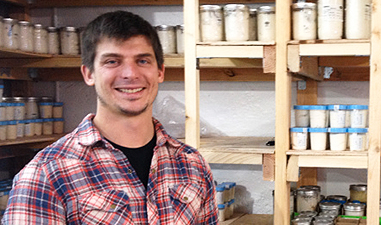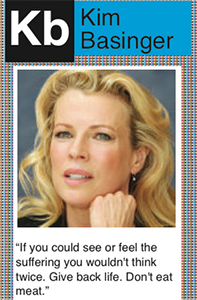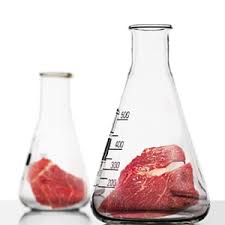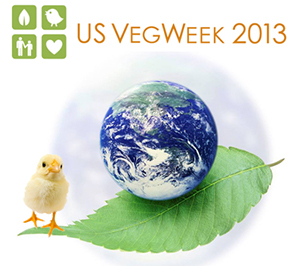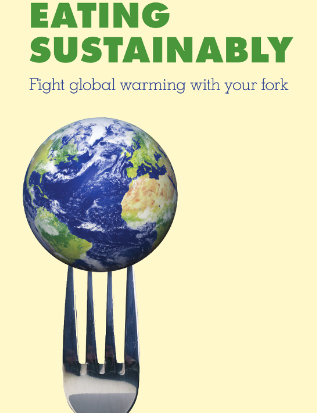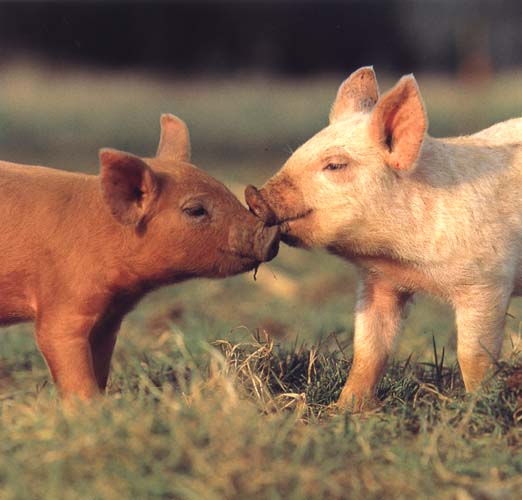You know you can bake at home without using eggs, so why don’t major food manufacturers cut the cruelty and go egg-free? Enter Hampton Creek Foods, a one year-old company backed by well-known venture capitalists that is cracking the code on eggs and hatching a cruelty-free solution.
The Chemistry of Being Meat-Free: A Periodic Table of Veg Celebrities
Even for those of us who weren’t chemistry buffs, the periodic table of elements always had interesting appeal, perhaps because the renowned chart demonstrated so much ingenuity and potential in the world around us. What else has potential? Choosing vegan foods. Simply by leaving animals off of our plates, we can prevent and reverse illness, preserve the environment and precious resources, and protect billions of cows, chickens, and pigs from a life of suffering.
The First Burger Made from In Vitro Meat
From Tofurky sausages to Gardein chicken to Daiya vegan cheese, plant-based meats and dairy products are quickly gaining popularity–and winning over the hearts and tastes of thousands. In fact, according to the U.S. Dept. of Agriculture, meat consumption nationwide has decreased 12% since 2007–and more people are searching for information on vegan eating.
US VegWeek 2013 Kicks Off Today – Earth Day!
Today marks the 43rd anniversary of Earth Day, a day intended to encourage individuals to take meaningful actions in their everyday lives that, collectively, contribute to preserving the planet. But in the words of late Wisconsin Senator Gaylord Nelson who founded Earth Day, “Our goal is not just an environment of clean air and water and scenic beauty. The objective is an environment of decency, quality and mutual respect for all other human beings and all other living creatures.”
A Four-Pronged Approach to Protecting the Planet
For over 40 years, Earth Day—celebrated on April 22—has been inspiring people to take steps to help the environment. Did you know that perhaps the single most important action each of us can take to protect the planet is simply to choose meat-free foods?
Earth Day offers the perfect opportunity to empower others to fight global warming and animal abuse with our forks, and COK’s popular Eating Sustainably brochure is a great way to share this important message.
Newly updated for 2013, this trifold brochure is packed with information (citations included) about the negative environmental impacts of animal agriculture while also highlighting the global calls to action from the United Nations to shift towards a more plant-based diet.
This Weekend: Largest Climate Change Rally in History – What about the Carbon Footprint of the Ralliers?
People are catching buses from all over the country to come to the nation’s capital this weekend for the largest climate change rally in history — a rally against the construction of the Keystone XL Pipeline. This pipeline, which has been called a “game over for the environment,” would connect the tar sands extraction project in Alberta, Canada with various points across the US, allowing Alberta to ramp up oil extraction. It’s widely considered a major threat to our environment — but what about the carbon footprint of the rally?
This Valentine’s Day Have a Heart for Animals, Your Health, and the Environment
Every year on Valentine’s Day, we’re inclined to buy candies, cards, flowers, and stuffed animals to show our loved ones, friends, and family just how much we care. Why not, however, go beyond these small displays of affection and make choices that truly have a positive impact for animals, for your health, and the environment? It’s as simple as choosing to leave animals off our plate this Valentine’s Day.
Our Forks: A Four-Pronged Approach to Protect the Planet
For over 40 years, Earth Day—celebrated on April 22—has been inspiring people everywhere to take steps to help the environment. Did you know that perhaps the single most important action each of us can take to protect the planet is simply to choose meat-free foods?
Animal agriculture is considered one of the leading causes of pollution and resource depletion today. According to the United Nations, raising chickens, turkeys, pigs, cows and other animals for food contributes nearly one-fifth (18%) of all global human-induced greenhouse gas emissions.
Al Gore on Global Warming: Eat Less Meat
While Al Gore’s highly-acclaimed and award-winning documentary “An Inconvenient Truth” may have conveniently neglected to highlight the harmful impact of our dietary choices, in a recent interview, the former vice-president suggests curbing our meat consumption to help curb global warming.

